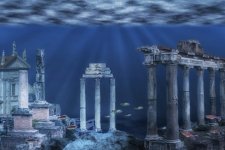Menu
Install the app
How to install the app on iOS
Follow along with the video below to see how to install our site as a web app on your home screen.
Note: This feature may not be available in some browsers.
You are using an out of date browser. It may not display this or other websites correctly.
You should upgrade or use an alternative browser.
You should upgrade or use an alternative browser.
Greek History Community
What is the myth of Santorini and Atlantis?
- Thread starter greek_ggirl
- Start date
1 - 3 of 3 Posts
dpappas87
Active member
This story shared some elements with the myth of Atlantis, and there are those who believe that the mythological city of Atlantis that Plato wrote about, and that has been romanticized over the centuries, is actually the portion of Santorini that sunk to the bottom of the sea after the volcano erupted.
k_tsoukalas
Administrator
If you find yourself in Santorini you can check out this museum to learn about it!

 www.greekboston.com
www.greekboston.com

Experience the Lost Atlantis Museum in Santorini
Visit the Lost Atlantis Museum while in Santorini, Greece.
1 - 3 of 3 Posts
JOIN THE DISCUSSION AND READ OTHER GREEK INFO:
History of the tradition of decorating boats for Christmas
- voula_slat
- Greek History Forum
- Replies: 1
One of the most interesting Greek Christmas traditions to me is the one where people decorate boats. So, I started to research the history. Here's a bit of what I discovered:
The roots of the tradition of decorating boats in Greece for Christmas can be traced back to the country's longstanding ties with the sea. In Ancient Greece, people would often looked to the sea for both sustenance and inspiration, and it was not uncommon for ships to be adorned with religious symbols and decorations.
It also has ties to early Christianity in Greece. According to Greek Orthodox beliefs, Saint Nicolas (aka Santa Claus) was a sailor, and he is the patron saint of sailors. Decorating boats is often seen as a way to honor him.
Over time, this practice became associated with the Christmas season, and the boats began to be decorated specifically for the holiday.
People also make paper boats to decorate. Some call these the "yule boat" or karavaki. One of the most famous examples of this practice is the Yule boat, or karavaki.
The earliest known evidence of decorating boats for Christmas in Greece dates back to the 19th century. During this time, sailors would deck out their boats with lights and tiny boats. These tiny boats were often placed inside the larger boat, symbolizing protection from harm while at sea.
Does anyone have anything to add?
The roots of the tradition of decorating boats in Greece for Christmas can be traced back to the country's longstanding ties with the sea. In Ancient Greece, people would often looked to the sea for both sustenance and inspiration, and it was not uncommon for ships to be adorned with religious symbols and decorations.
It also has ties to early Christianity in Greece. According to Greek Orthodox beliefs, Saint Nicolas (aka Santa Claus) was a sailor, and he is the patron saint of sailors. Decorating boats is often seen as a way to honor him.
Over time, this practice became associated with the Christmas season, and the boats began to be decorated specifically for the holiday.
People also make paper boats to decorate. Some call these the "yule boat" or karavaki. One of the most famous examples of this practice is the Yule boat, or karavaki.
The earliest known evidence of decorating boats for Christmas in Greece dates back to the 19th century. During this time, sailors would deck out their boats with lights and tiny boats. These tiny boats were often placed inside the larger boat, symbolizing protection from harm while at sea.
Does anyone have anything to add?
Learning about the Spartan way of life
- dimi_pat
- Greek History Forum
- Replies: 1
I find the Spartans fascinating. They seemed to have a different way of life!
The Spartans, known for their military might, also led a lifestyle that was remarkably disciplined and focused on simplicity.
The core of Spartan society was its military-oriented ethos. From a young age, Spartan boys were trained to be soldiers in the agoge, a rigorous education system that emphasized physical training, endurance, and survival skills. This preparation was not just about warfare but about creating individuals who were resilient, self-sufficient, and disciplined.
But Spartan discipline extended beyond the military sphere. Spartans lived a life of austerity and frugality that is quite alien to our modern way of living. Meals were simple, homes were unadorned, and luxuries were frowned upon. This was not out of a lack of resources but a deliberate choice to avoid softness and dependency on material comforts.
Interestingly, this Spartan simplicity also fostered a sense of equality among citizens. By eschewing luxury, Spartans aimed to reduce divisions within their society. Wealth and status were downplayed, while military prowess and moral integrity were valued above all.
What do you guys think about this or what can you add to my thinking?
The Spartans, known for their military might, also led a lifestyle that was remarkably disciplined and focused on simplicity.
The core of Spartan society was its military-oriented ethos. From a young age, Spartan boys were trained to be soldiers in the agoge, a rigorous education system that emphasized physical training, endurance, and survival skills. This preparation was not just about warfare but about creating individuals who were resilient, self-sufficient, and disciplined.
But Spartan discipline extended beyond the military sphere. Spartans lived a life of austerity and frugality that is quite alien to our modern way of living. Meals were simple, homes were unadorned, and luxuries were frowned upon. This was not out of a lack of resources but a deliberate choice to avoid softness and dependency on material comforts.
Interestingly, this Spartan simplicity also fostered a sense of equality among citizens. By eschewing luxury, Spartans aimed to reduce divisions within their society. Wealth and status were downplayed, while military prowess and moral integrity were valued above all.
What do you guys think about this or what can you add to my thinking?
What did the Ancient Greeks eat?
- mj_toronto8
- Greek History Forum
- Replies: 1
I am fascinated by the Ancient Greeks. I have a feeling that some of our modern Greek recipes are similar to the ancient ones. Like spoon sweets. It think that seems like something that was developed a long time ago as a way to preserve the fruit harvest.
So, I have been researching this. What did the Ancient Greeks eat? I wanted to share this video because I thought it was interesting.
So, I have been researching this. What did the Ancient Greeks eat? I wanted to share this video because I thought it was interesting.
Learning about the Olympic Games
- paharo45
- Greek History Forum
- Replies: 1
It's an Olympics year so I thought I would chat a bit about the Olympic Games!
The original Olympic Games, held in Olympia, Greece, were primarily a festival celebrating Zeus, the king of the Greek gods. These games began around 776 BC and featured a range of athletic competitions, from foot races to combat sports like wrestling and boxing. Interestingly, the games were so significant that wars were put on hold, and conflicts paused to allow athletes and spectators to travel safely to Olympia. This ancient tradition of the Olympic Truce or "Ekecheiria" is a testament to the power of sport in fostering peace and unity, a principle that remains at the heart of the Olympics today.
I find it absolutely intriguing how these ancient games laid the groundwork for the modern Olympics, introducing concepts of sportsmanship, excellence, and the idea of bringing people together through the universal language of sport.
Has anyone visited ancient Olympia? Do you guys enjoy watching the Olympic Games?
The original Olympic Games, held in Olympia, Greece, were primarily a festival celebrating Zeus, the king of the Greek gods. These games began around 776 BC and featured a range of athletic competitions, from foot races to combat sports like wrestling and boxing. Interestingly, the games were so significant that wars were put on hold, and conflicts paused to allow athletes and spectators to travel safely to Olympia. This ancient tradition of the Olympic Truce or "Ekecheiria" is a testament to the power of sport in fostering peace and unity, a principle that remains at the heart of the Olympics today.
I find it absolutely intriguing how these ancient games laid the groundwork for the modern Olympics, introducing concepts of sportsmanship, excellence, and the idea of bringing people together through the universal language of sport.
Has anyone visited ancient Olympia? Do you guys enjoy watching the Olympic Games?
Information About Alexander the Great
- nadellii
- Greek History Forum
- Replies: 1
I have always been fascinated by Alexander the Great. I have this sense that depending on how you look at what he did, you could see it differently.
Sure, he conquered and spread hellenism. But what about the place he conquered? How did they feel? I am guessing not very favorable towards him.
If found this documentary on YouTube created by the history channel. I thought I'd watch it. I found it interesting and wanted to share.
Sure, he conquered and spread hellenism. But what about the place he conquered? How did they feel? I am guessing not very favorable towards him.
If found this documentary on YouTube created by the history channel. I thought I'd watch it. I found it interesting and wanted to share.
Share and discuss Greek history!
WorldwideGreeks.com is a free online forum community where people can discuss Greek food, travel, traditions, history and mythology.
Join Worldwide Greeks here!
Join Worldwide Greeks here!
JOIN COMMUNITY FOR FREE
LOGIN TO YOUR ACCOUNT



